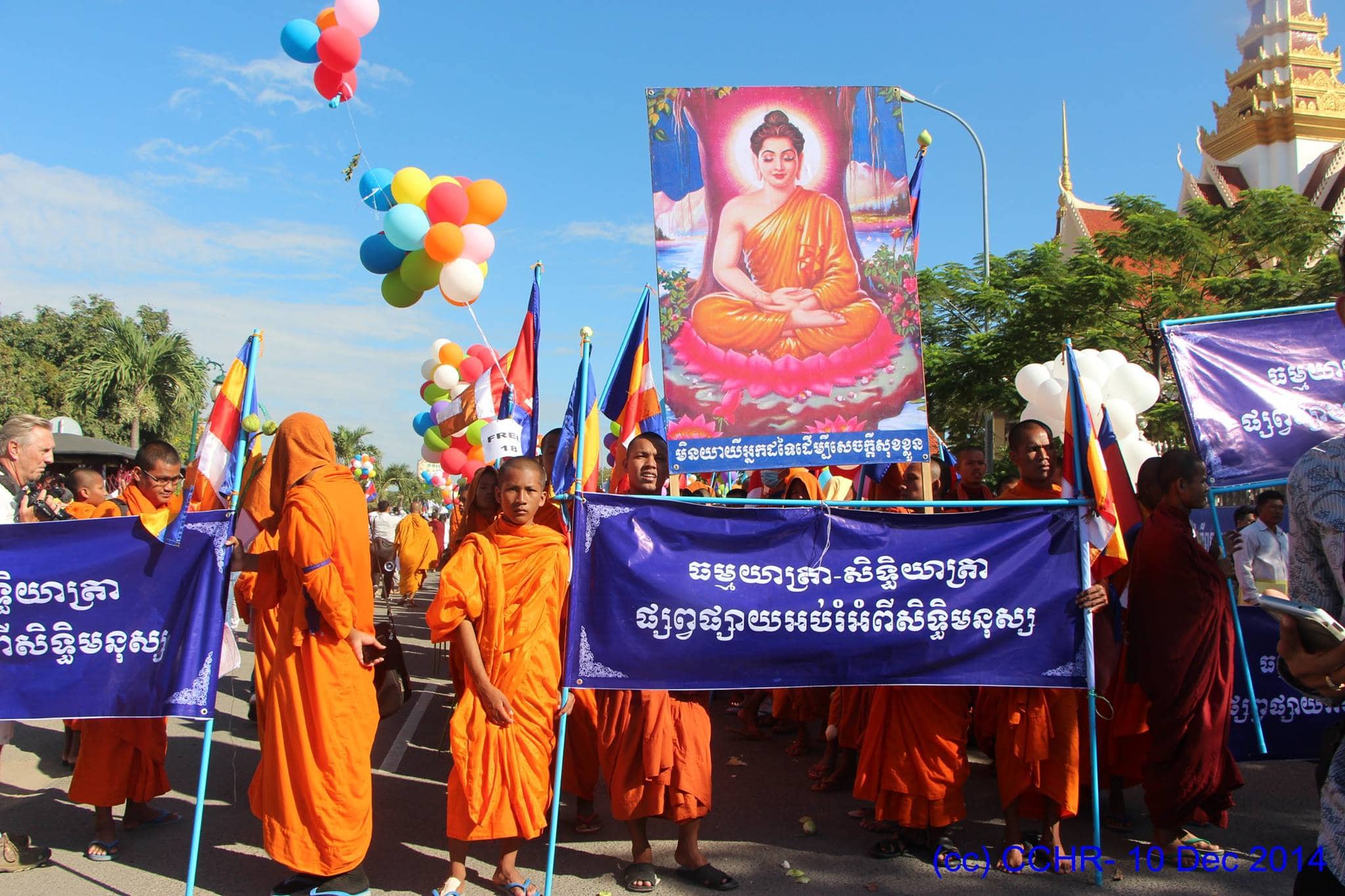10 December is an important moment for the human rights community in Cambodia to raise their concerns, and last week human rights defenders, monks, activists and civil society groups marched from across the country to Phnom Penh.
This statement was originally published on blog.sithi.org on 10 December 2014.
Today, 10 December, marks International Human Rights Day (“IHRD”). Proclaimed by the UN General Assembly in 1950, IHRD aims to bring the world’s attention to the Universal Declaration of Human Rights (“UDHR”) as “the common standard of achievement for all peoples and all nations.”[1] However, despite the dramatic improvement in Cambodia’s human rights situation since the Khmer Rouge atrocities of the 1970s, human rights violations remain a serious problem in Cambodian society, with those from poor and marginalized communities particularly affected. IHRD is an important moment for the human rights community in Cambodia to raise their concerns, and over the last few days human rights defenders (“HRDs”), monks, activists and civil society groups marched from across the country to Phnom Penh. They gathered outside the National Assembly this morning to call for, among other things, improved labour rights, land rights, and the release of imprisoned fellow activists.
Yesterday, the Cambodian Center for Human Rights (“CCHR”) launched an exhibition entitled, “Where is My Justice?”, which highlights Cambodia’s deeply rooted culture of impunity and shares the experiences of victims of human rights violations. Impunity affects a wide range of people in Cambodia, from demonstrators subjected to excessive use of force by the police and judicial harassment, to people forcibly evicted from their homes in illegal land grabs or members of the Lesbian Gay Bisexual and Transgender (LGBT) community who face discrimination and attacks; all have failed to receive justice for crimes committed against them.
“About six to seven security guards beat me, I was kicked with their big boots and I lost consciousness. I haven’t received justice yet because I am just a reporter.” – Lay Samean, Journalist [2]
In addition, a weak separation of powers allows the courts to be used to silence HRDs, members of the political opposition, union leaders and journalists. The passing of three laws in May 2014 further undermined judicial independence by increasing executive control of the courts. Activists are often charged with “incitement to commit violence” or “defamation” without evidence, facing jail time and large fines.
In early 2014, a number of demonstrations took place across Cambodia calling for garment workers’ wages and working conditions to be improved. This led to serious violations of the right to freedom of expression and assembly, including a blanket ban on demonstrations and the detention of protestors without charge, some of whom were forced to sign written statements agreeing not to take part in future demonstrations before their release. Furthermore, state security personnel used excessive force during some protests, including firing live ammunition into crowds of demonstrators, causing a number of deaths. All reported uses of excessive force by the authorities must be thoroughly and independently investigated.
“I have not received justice, and the military forces that violated my rights have not been punished. I was a victim, but I was put in prison.” – Sokun Sambath Piseth, former NGO worker [3]
Land disputes, often involving harassment and attacks in attempts to force people from their land to make way for real estate, industrial and infrastructure development and the exploitation of Cambodia’s rich natural resources remained a key issue in 2014. In August, CCHR issued an open letter addressed to Prime Minister Hun Sen requesting improvements in land registration, greater provision of formal land titles and a moratorium on land evictions.
“I was continually attacked and beaten, they tried to burn my home down, and they threw a cobra inside. Even though we have filed complaints, I feel that no one will find justice for us.” – Ly Seav Minh, Phnom Penh resident [4]
Despite significant issues remaining, the overall human rights situation in Cambodia appears to be on a positive long-term trajectory. Cambodians are increasingly aware of their rights, and have shown considerable courage in fighting for them. As highlighted by the UN Special Rapporteur on the situation of human rights in Cambodia in a report released in August, “New ways will be found to meet the rising expectations of the increasingly aware and demanding Cambodian people.”
CCHR will continue to stand in solidarity with all those working for the promotion and protection of human rights, in Cambodia and around the world.
[1] United Nations, Human Rights Day.
[2] On 2 May 2014, Lay Samean, a reporter with Voice of Democracy, covered a rally held by opposition party supporters at Freedom Park in Phnom Penh. He was attacked and beaten by security guards as he tried to take photos of them chasing a monk, and left lying unconscious in the street. He had to travel to Bangkok for surgery for head injuries and a broken cheekbone and his vision has been permanently affected. Nobody has been held to account for the attack.
[3] Sokun Sambath Piseth, a former NGO worker, was monitoring a strike in January 2014 when he was beaten and his arm was broken by security forces. He was arrested along with 22 others, charged with a number of offences including intentional violence with aggravating circumstances and sentenced to a term of imprisonment, despite not being involved in the strike.
[4] Ly Seav Minh’s family is involved in a land dispute with the Khun Sear Import Export Company – owned by tycoon Khun Sear – after they refused to vacate a plot of land in the Boeung Kak 1 area of Phnom Penh’s Tuol Kork district, which they have inhabited since 1982. The family has suffered death threats, violent attacks and intimidation as a result.
Lois Gauthier, CCHR International Intern, contributed to this blog post.



